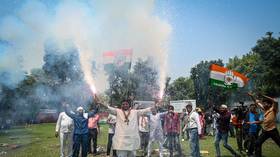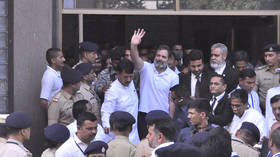Ruling party’s defeat in a key state rings alarm bells for Indian PM Modi

The right-wing Bharatiya Janata Party (BJP) suffered a humiliating defeat against the main opposition, the Indian National Congress, in the Karnataka legislative elections.
India uses the first-past-the-post (FPTP) voting system, which is borrowed from its former colonial ruler, Britain. It is also known as the simple majority system, where a candidate with the highest number of votes in a constituency is declared the winner.
The system is used in direct elections to the lower house of parliament, known as Lok Sabha, and state legislative assemblies. One major criticism for FPTP is that it does not always allow for a representative mandate, as the person could win despite securing less than half of the votes in an electoral contest.
Under this system, the Congress won a simple majority, or more than 50% of the seats, in the 224-member state legislature. The party secured 42.88% of the vote share, which is its highest since 1989. The Congress won 135 seats – the halfway mark to form the government was 122 – while the BJP, which was previously in power, won only 66 seats. Regional party Janata Dal (Secular), won 19.
The vote effectively wipes out the BJP from India’s southern state of Karnataka, the most developed part of the country, ahead of next year’s crucial parliamentary elections.
Under charismatic leader, Prime Minister Narendra Modi, the BJP has ruled India since 2014 amid growing polarization and communal conflagration that has threatened the country’s social fabric. The largest party in the world, with over 180 million members, the BJP was trying to shield Modi from reverses in the Karnataka election. But the loss has dented his vote-catcher image after a poor showing at the hustings.
Modi had pulled out all stops, including a massive roadshow in the state capital and information technology hub of the nation, Bengaluru, before the elections were held in a single phase on May 10. Altogether, the prime minister had addressed 19 rallies and six roadshows to buck the anti-incumbency trend in the state that was beset all along by massive infighting within his party’s ranks.
On the contrary, the Congress, whose popularity plumbed new depths after successive defeats in the 2014 and 2019 parliamentary elections, got a shot in the arm in Karnataka and parts of south India following the impact of former party president Rahul Gandhi’s Bharat Jodo Yatra, a five-month walk through the country featuring political marches, addresses, and rallies.
Gandhi told reporters in New Delhi after his party’s win that “poor people defeated crony capitalists in Karnataka. We didn’t fight this battle using hatred.” The scion of the Gandhi-Nehru family, which has given three prime ministers since the country gained independence from the British in 1947, exuded optimism that the Karnataka trend would catch on in other states such as Rajasthan, Madhya Pradesh, Chhattisgarh, and Telangana, which are slated to go to the polls later this year.
The Congress’s victory could not have come at a more opportune time – it has faced an existential crisis since it was voted out of power in 2014. The Karnataka win is also the first time that the Congress has won against the BJP since 2019 in a direct two-way contest.
The newly elected members of the legislative assembly have decided to empower Congress President Mallikarjun Kharge to take a call on who will be the new chief minister candidate in the state. A slogan war has broken out between supporters of Doddalahalli Kempegowda Shivakumar and Siddaramaiah, who goes by one name and has held the top job in the state between 2013 and 2018.
Karnataka is a key state in the world’s largest democracy. It is one of the most prominent manufacturing states in the country and a sought-after destination for foreign direct investments. A stable government will ensure that multinational companies such Apple iPhone manufacturer Foxconn will continue to invest in the state.
Traditionally, south Indian states have always outperformed their northern counterparts, and they remain the ruling BJP’s last frontier to be conquered.














